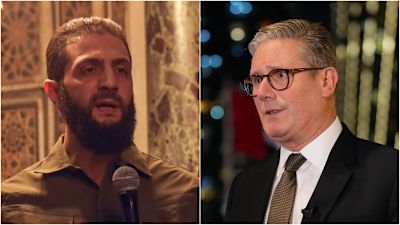Starmer says 'no decision pending' on removal of Syrian rebel group from terror list

The welcome that Britain has given to the end of President Assad's regime has been tempered by significant caution, ITV News' Political Correspondent Shehab Khan reports
Sir Keir Starmer has said there is "no decision pending" on whether to take Hayat Tahrir al-Sham (HTS) off the banned terror list, after the rebel group ended the 50-year Assad family regime in Syria.
HTS is a proscribed terrorist group in the UK. Its leader, Abu Mohammed al-Golani has historical links to Al-Qaeda and the late ISIS leader, Abu Bakr al-Baghdadi.
While in Saudi Arabia meeting leaders on Monday, the prime minister was asked whether HTS should be removed from the terror list.
The Chancellor of the Duchy of Lancaster, Pat McFadden, had previously said the government would "consider" removing the group, and said a decision needed to be taken quickly.
"We mustn't get ahead of ourselves on what happens next," the prime minister said
Contradicting McFadden hours later, Starmer said: "No decision is pending at all on this. It is far too early at the moment.
"The focus has to be on talking to our allies.
"This is an opportunity for Syria and we therefore have to make sure it is a peaceful opportunity, talking to our allies, making sure civilians are protected, making sure minorities are protected and being absolutely clear on that red line in relation to terrorism and violence," the prime minister added.
"We mustn't get ahead of ourselves on what happens next, but focus on making this a turning point for the good."
Pat McFadden, the Chancellor of the Duchy of Lancaster, had told ITV News earlier on Monday the government "will review" the terror status of HTS.
Rebel groups led by HTS seized Damascus on Sunday, marking the fall of the 50 year rule by the Assad family in the country.
In a statement on Sunday, Sir Keir Starmer welcomed the fall of Assad’s “barbaric regime” and called for the restoration of “peace and stability”.
Why are HTS a proscribed terror group?
HTS were proscribed by the UK government in 2017, because of the group's connections to al-Qaeda.
The group's leader Abu Mohammed al-Golani fought for al-Qaeda in Iraq - back then the group was known as the Nusra Front.
Al-Golani cut ties with al-Qaeda in 2016 and has since tried to shift HTS towards a more tolerant ideology.
Under the Terrorism Act 2000, the home secretary can proscribe an organisation if they believe it commits of participates in, prepares for, promotes or encourages, or is otherwise concerned in terrorism, and if it is proportionate to do so.
Because HTS are proscribed, the UK government are unable to engage with them - which raises difficult questions for the relationship between the UK and Syria.
The US government currently have a $10m bounty on al-Golani's head, after they designated HTS a Foreign Terrorist Organisation in 2018.
Subscribe free to our weekly newsletter for exclusive and original coverage from ITV News. Direct to your inbox every Friday morning.
How do HTS say they've changed?
Al-Golani has signalled he no longer associates with hardline jihadi extremism, and now believes in pluralism and respecting minorities.
In 2021 he said he no longer wanted to wage war on western countries, and in an interview on Friday told CNN he will create a government in Syria based on "a council chosen by the people", with Syria moving to a "state of governance, institutions and so on."
He defended the rights of minority religious groups in an interview with CNN, saying "no-one has the right to erase another group."
The HTS leader said the group should not be classed as terrorist, saying the proscription is " primarily political and, at the same time, inaccurate."
But concerns remain about the position of women and LGBTQ+ people under HTS rule.
What has the UK government said?
Senior cabinet minister Pat McFadden confirmed the government "will review" the terror status of HTS, but said "I don't know how long that will take."
In interviews with other broadcasters however, McFadden said any change in the ban would be a "relatively swift decision."
When asked about the changed character of the group, he said al-Golani "has been saying things in recent days which distance himself from the past, and saying he wants to respect the rights of all Syrians including religious minorities.
"We hope that's the case, but the truth is at the moment the future is very uncertain."
McFadden said al-Golani has been "associated with extremist groups in the past, he's the new leader in Syria, let's see what the character of the regime will be like."
The minister told ITV News the government feels "a combination of relief but great uncertainty too."
Under Section 4 of the Terrorism Act, the government can deproscribe an organisation, but only if that organisation applies to the Home Secretary to have the ban removed.
The House of Commons and the House of Lords must then both agree on the deproscription.
Could there still be a terror threat under HTS?
There are still concerns about extremism in Syria after the historic fall of Assad on Sunday.
Former head of MI6 Sir Alex Younger told the BBC there was a "vacuum" created by the end of the Assad regime, in which he said IS could re-group.
Younger warned there could now be a "serious spike" in the threat posed by Islamic State (IS).
Have you heard The Trapped? Listen as Daniel Hewitt exposes the UK's dirty secret.